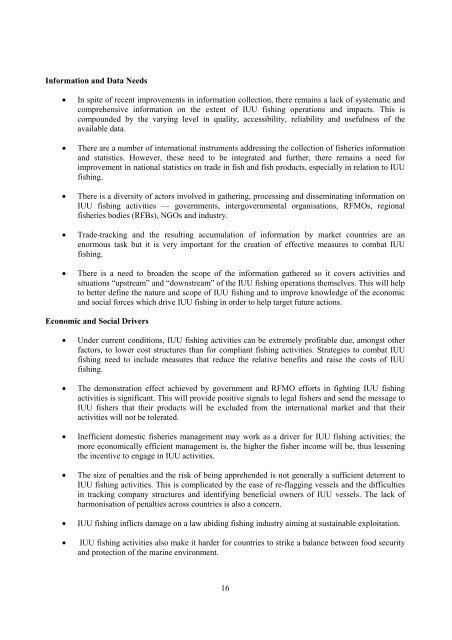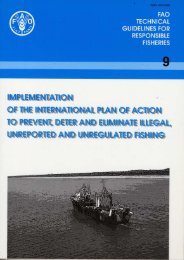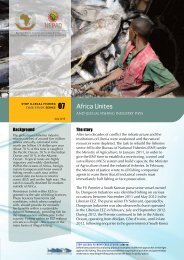1 Addressing Illegal, Unreported and Unregulated (IUU ... - OECD
1 Addressing Illegal, Unreported and Unregulated (IUU ... - OECD
1 Addressing Illegal, Unreported and Unregulated (IUU ... - OECD
You also want an ePaper? Increase the reach of your titles
YUMPU automatically turns print PDFs into web optimized ePapers that Google loves.
Information <strong>and</strong> Data NeedsxxxxxIn spite of recent improvements in information collection, there remains a lack of systematic <strong>and</strong>comprehensive information on the extent of <strong>IUU</strong> fishing operations <strong>and</strong> impacts. This iscompounded by the varying level in quality, accessibility, reliability <strong>and</strong> usefulness of theavailable data.There are a number of international instruments addressing the collection of fisheries information<strong>and</strong> statistics. However, these need to be integrated <strong>and</strong> further, there remains a need forimprovement in national statistics on trade in fish <strong>and</strong> fish products, especially in relation to <strong>IUU</strong>fishing.There is a diversity of actors involved in gathering, processing <strong>and</strong> disseminating information on<strong>IUU</strong> fishing activities — governments, intergovernmental organisations, RFMOs, regionalfisheries bodies (RFBs), NGOs <strong>and</strong> industry.Trade-tracking <strong>and</strong> the resulting accumulation of information by market countries are anenormous task but it is very important for the creation of effective measures to combat <strong>IUU</strong>fishing.There is a need to broaden the scope of the information gathered so it covers activities <strong>and</strong>situations “upstream” <strong>and</strong> “downstream” of the <strong>IUU</strong> fishing operations themselves. This will helpto better define the nature <strong>and</strong> scope of <strong>IUU</strong> fishing <strong>and</strong> to improve knowledge of the economic<strong>and</strong> social forces which drive <strong>IUU</strong> fishing in order to help target future actions.Economic <strong>and</strong> Social DriversxxxxxxUnder current conditions, <strong>IUU</strong> fishing activities can be extremely profitable due, amongst otherfactors, to lower cost structures than for compliant fishing activities. Strategies to combat <strong>IUU</strong>fishing need to include measures that reduce the relative benefits <strong>and</strong> raise the costs of <strong>IUU</strong>fishing.The demonstration effect achieved by government <strong>and</strong> RFMO efforts in fighting <strong>IUU</strong> fishingactivities is significant. This will provide positive signals to legal fishers <strong>and</strong> send the message to<strong>IUU</strong> fishers that their products will be excluded from the international market <strong>and</strong> that theiractivities will not be tolerated.Inefficient domestic fisheries management may work as a driver for <strong>IUU</strong> fishing activities; themore economically efficient management is, the higher the fisher income will be, thus lesseningthe incentive to engage in <strong>IUU</strong> activities.The size of penalties <strong>and</strong> the risk of being apprehended is not generally a sufficient deterrent to<strong>IUU</strong> fishing activities. This is complicated by the ease of re-flagging vessels <strong>and</strong> the difficultiesin tracking company structures <strong>and</strong> identifying beneficial owners of <strong>IUU</strong> vessels. The lack ofharmonisation of penalties across countries is also a concern.<strong>IUU</strong> fishing inflicts damage on a law abiding fishing industry aiming at sustainable exploitation.<strong>IUU</strong> fishing activities also make it harder for countries to strike a balance between food security<strong>and</strong> protection of the marine environment.16
















